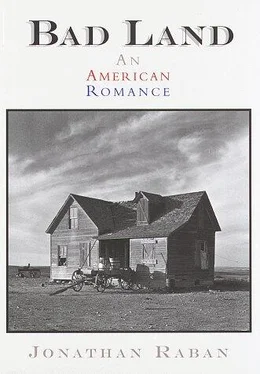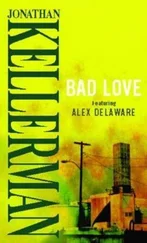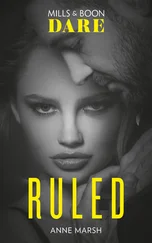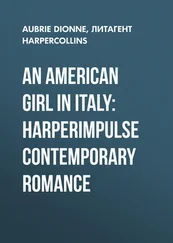The most unlucky, or least resourceful, of the homesteaders went on from here to the Columbia valley, where they picked apples. The orchards of eastern Washington offered jobs, of a sort, to the swarm of transient labor created by the Dustbowl. The erstwhile farmers of Montana worked shoulder to shoulder in the orchards with the dispossessed sharecroppers of the South. In the American way, they lost their former identities and were given new names. It didn’t matter what state you had come from; out in the far West, you were called an Okie, sometimes an Arkie. The terms were contemptuous. They denoted people who were worth, at best, 15¢ an hour. For many of the homesteaders, it was a heartbreaking, spirit-sapping return to the serfdom that they had come to America to escape.
I spent the night in Spokane, then headed west, on US 2. It was snowing again. Outside the gates of the Boeing plant, a picket line of frozen strikers held up snow-fringed placards: I gave them three honks of the car horn, tooting solidarity. The salute had little to do with the particular cause of the Boeing machinists. It was more a way of saying hello to my own kind — urban-industrial types; the unself-sufficient; people with cars not pickups, and shoes, not boots; pizza-delivery clients; registered Democrats.
Not far beyond Spokane, the sagebrush came back, and a long, desolate reach of broken prairie, rifted with shallow coulees. Abandoned farmhouses showed on the skyline. To come so far from the dry plains, only to find them here once more, cannot have done much to raise the hopes of the new arrivals. You might be riding the rails, spread-eagled under the carriage of a Great Northern express, and see, between the wheels, the same twiggy sage, same feeble grass, same dust, same ruins that you thought you’d left more than eight hundred miles behind.
On AM radio, an evangelist was talking, interestingly, about flying squirrels in the Book of Revelation. I tuned him out when I discovered, after several minutes, that he was referring only to flying scrolls. On the next-door channel, G. Gordon Liddy was referring to himself as “The G-Man,” and talking twaddle about the government. The radio was best left switched off. If one listened to it for long in eastern Washington, one could easily become convinced that one had entered the national capital of religiose bigotry, where soi-disant Christians were getting up a jihad to cleanse the earth of their enemies. When they defined their enemies, it was clear that they meant me.
The road wound down, with icy patches in the shadows, to the sage-green water of Franklin D. Roosevelt Lake, above the Grand Coulee Dam. For no region of the country got more from the New Deal than the now vengefully conservative eastern half of Washington. I had never seen the dam, and took the detour to it in a spirit of political pilgrimage: I wanted something positive to set against G. Gordon Liddy and his tribe of mean-minded admirers. I would have liked a Woody Guthrie tape to slip into the car stereo:
Look down in the canyon and there you will see,
The Grand Coulee showers her blessings on me;
The lights for the city, for factory, and mill,
Green pastures of plenty from dry barren hills …
The dripping concrete face of the dam, pitched between two bald mountains, was pharaonic. It was bland, gray and sizeless, with nothing to convey a human scale, like a window, or a walkway. The indentations of the sluices looked like teeth. The thing might easily have been mistaken for the slave-built tomb of some legendary despot.
That it could be traced back to a crippled dandy, inhaling cigarettes through an amber holder, was a happy contradiction. One looked at the dam’s gross solidity, then thought of Roosevelt, with his wasted legs, obsessively hiding his disability from the people. The dam was the invincible public face, of the-only-thing-we-have-to-fear-is-fear-itself. Backed up behind it, hundreds of feet deep, was the lake with Roosevelt’s name on it. Had he, I wondered, deliberately chosen the lake, not the dam, as his personal memorial?
Inside the visitor center were hung photographs that might have been taken around Ismay, of collapsing houses, vacated in the drought. The dam’s first intended function had been to irrigate the dry-land farms of the Columbia valley. But the Second World War, when Roosevelt committed the United States to being “the great arsenal of democracy,” created such a demand for power that the dam was dedicated to the manufacture of electricity. It wasn’t until 1951 that the irrigation project got under way. At the ceremony for the opening of the Grand Coulee Main Canal, forty-eight gauze-clad “apple princesses,” representing the states of America, stood in line against a waist-high rope on the lip of the dam, and emptied jugs of Columbia water into the new canal. Intrepid apple princesses! They must have been selected less on the basis of their beauty than for their head for heights.
I went on west, over empty prairie country, met up again with the Columbia at Bridgeport, and followed the river down to Wenatchee. The wall-like sides of the Columbia valley were bare of almost all vegetation except for the stubborn, shivering clumps of sagebrush. There were shale falls, jagged splinters of rust-colored rock, the occasional nesting conifer. Left to nature, the great U-shaped valley, with the Columbia sliding through it, brown as sludge, would have appeared sterile, as if poisoned by its river.
But it had not been left to nature. At the lower levels, wherever there was a flattish tongue or ledge of ground, there was an orchard. The apple trees were planted equidistantly, eight feet apart, in severe ranks, like soldiers on parade. At intervals of twenty feet, the steel nozzles of sprinklers protruded from the soil. High-tech windmills, strategically positioned, pumped water from the river to the apple roots. All the pleasant connotations of the word “orchard” (as in “the chaffinch sings on the orchard bough,” or “Deep meadow’d, happy, fair with orchard lawns”) fell abruptly away at the sight of these strange industrial orchards with their platoons of identical, barbered apple-producing units.
It was wonderfully efficient. Each acre — each half-acre — of soil was fully employed and working round the clock. Anyone with, say, twenty acres of these tongues and ledges would be rich; or so it looked.
In the 1920s — before the Columbia was dammed and canalized, and before the introduction of powerful electric pumps — the orchards were irrigated by the dozens of small tributary streams that drained into the rive. This gravity-fed system had worked well enough to maintain a settled, and standoffish, apple aristocracy, centered on the city of Wenatchee. The successful orchardists (as they called themselves) were able to ride out the Great Depression.
Went to Wenatchee, Washington. It was a common line in the family memoirs collected in Wheels Across Montana’s Prairie. In the spring, the ex-homesteaders, going west, met up with the north-going tide of Dustbowl refugees, who had spent the winter in the orange plantations of California. They paid two bits a night to stay on campgrounds, or slept rough in the “hobo jungles” down by the river. Cherries were the first fruit to ripen; the pickers were paid three-quarters of a cent per pound. General orchard labor: 12¢ to 15¢ an hour. In the apple packing sheds, the rate of pay was 3¢ a box. The college-educated (and many of the homesteaders had been to college in a previous life) competed for jobs as warehouse clerks in the offices of the big Wenatchee apple combines.
They fished in the Columbia, and panned for gold on the river bars. There wasn’t much gold, but prospecting could pay at least as well as apple picking; $3.00 or $4.00 a day, if you were both lucky and expert.
Читать дальше












